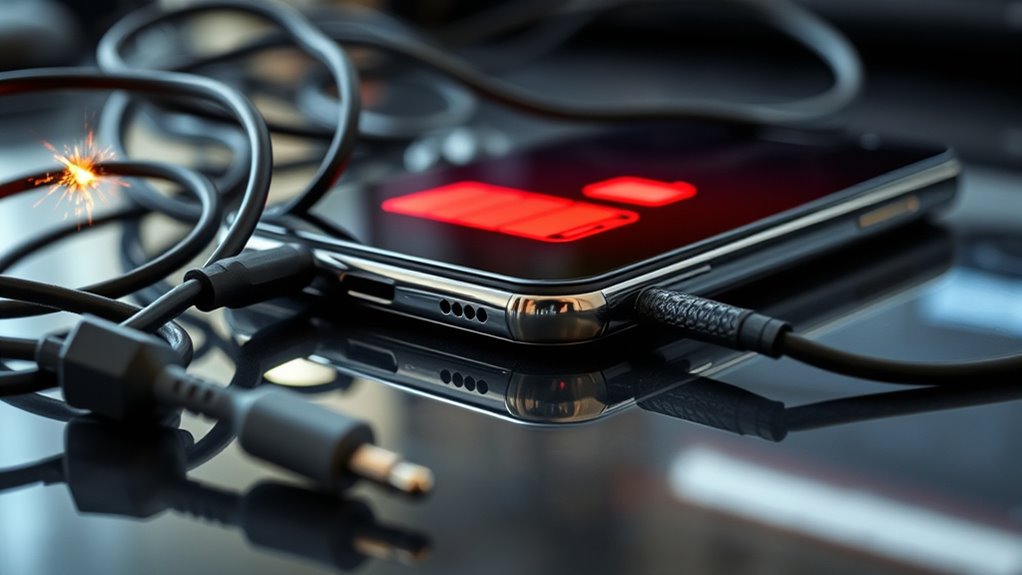Overcharging your devices can quietly harm your batteries, leading to faster wear, reduced lifespan, and higher risks of overheating or even fires. Data shows that continuously leaving devices plugged in causes chemical deterioration inside batteries and increases thermal runaway chances. Faulty chargers or damaged cables heighten safety dangers. By understanding these risks, you can protect your device’s health and safety—continue exploring to uncover more vital insights on preventing overcharge damage.
Key Takeaways
- Overcharging accelerates battery degradation, reducing device lifespan and increasing replacement costs.
- Persistent overcharging can lead to overheating, swelling, and potential fire hazards.
- Faulty chargers or cables heighten the risk of thermal runaway and device fires.
- Continuous overcharging weakens internal battery components, increasing safety risks over time.
- Proper charging practices significantly extend device safety and longevity, minimizing hidden fire and safety dangers.

Overcharging your electronic devices might seem harmless, but it can hide serious risks that often go unnoticed. When you leave your phone or laptop plugged in beyond full charge, you may think you’re just being cautious. However, over time, this habit accelerates battery degradation, which reduces your device’s overall lifespan. Lithium-ion batteries, the most common type in smartphones and tablets, are sensitive to overcharging. Constantly pushing them past their capacity can cause the battery’s chemical components to wear out faster, leading to decreased battery life and the need for earlier replacements. More importantly, overcharging increases the fire risk. While modern devices are equipped with safety features like built-in circuit protectors, these aren’t foolproof. Persistent overcharging can cause the battery to overheat, especially if the device’s cooling system isn’t adequate or if there’s a defect. Overheated batteries are more likely to swell, leak, or, in extreme cases, catch fire. This danger is often overlooked because most devices are designed to stop charging when full, but malfunctions or cheap chargers can bypass these safety features, making fire hazards more imminent.
You might not realize that overcharging doesn’t just affect battery health; it also creates a potential safety hazard in your home or office. Charging your device overnight or leaving it plugged in all day can seem convenient, but it increases the chances of overheating, especially if the charger or cable is faulty. Over time, the heat generated can weaken the battery’s internal structure, raising the likelihood of thermal runaway—a dangerous condition where the battery’s temperature spirals out of control, leading to fire or explosion. Some accidents have been linked to shoddy chargers or damaged cables that fail to cut off power once the battery reaches capacity, emphasizing the importance of using quality, certified charging equipment.
Being mindful of overcharging isn’t just about prolonging your device’s life; it’s a vital safety measure. Always unplug your device once it’s fully charged and avoid leaving it plugged in unnecessarily. Use chargers that are compatible and certified, and replace any damaged cables promptly. If your device gets excessively hot during charging, disconnect it immediately and have it inspected. Recognizing that battery degradation not only shortens your gadget’s usefulness but also poses fire risks makes it clear that overcharging is a habit worth breaking. Taking simple precautions today can prevent costly repairs, safeguard your safety, and extend the lifespan of your devices. Additionally, understanding the importance of battery safety and proper charging habits can significantly reduce the risk of accidents.
Frequently Asked Questions
How Can Consumers Detect Hidden Overcharging Tactics?
To spot hidden overcharging tactics, you need to stay alert to pricing tactics used by sellers. Always review your bills carefully and compare prices across different providers. Being aware of common tricks helps you recognize unexpected fees or inflated charges. Increase your consumer awareness by asking questions and reading the fine print. This proactive approach empowers you to catch overcharging early and avoid falling victim to deceptive pricing tactics.
Are Certain Industries More Prone to Overcharging Than Others?
Certain industries are more prone to overcharging because of their industry practices and pricing trends. For example, healthcare, telecom, and auto repair often have complex pricing structures that can hide extra costs. You should stay vigilant by comparing prices, asking for detailed quotes, and understanding industry norms. Recognizing these patterns helps you avoid falling victim to overcharging, regardless of the industry.
What Legal Recourse Is Available for Victims of Overcharging?
You might think overcharging is just part of doing business, but luckily, legal remedies exist for victims. Consumer protection laws offer you recourse, such as filing complaints, seeking refunds, or pursuing legal action. Ironically, these safeguards are in place precisely because overcharging erodes trust. So, you don’t have to accept unfair costs—your rights are protected, and legal channels stand ready to help you fight back against unjust charges.
How Does Overcharging Impact Long-Term Financial Health?
Overcharging can seriously impact your long-term financial health by damaging your credit score impacts and increasing debt accumulation. When you’re overcharged, you might miss payments or struggle to pay off debt, which lowers your credit score. This makes it harder to secure loans or favorable interest rates later. Over time, these issues can hinder your financial stability and growth, emphasizing the importance of addressing overcharging promptly.
Can Technology Help Prevent Overcharging Incidents?
Yes, technology can definitely help prevent overcharging incidents. Smart billing systems automatically calculate charges accurately, reducing human error. Fraud detection tools monitor transactions in real time, flagging suspicious activity before it reaches your account. By combining these technologies, you gain better control and protection against overcharges, ensuring your financial health stays intact. You’ll appreciate the peace of mind knowing that your billing process is more secure and reliable.
Conclusion
If you ignore the data on overcharging, you’re not just risking minor setbacks—you’re opening the floodgates to disaster! Overcharging can release chaos on your finances, damage your reputation, and even cause systems to collapse in a domino effect of failures. Don’t underestimate the power of charging too much; it’s like playing with fire in a fireworks factory. Stay vigilant, stay safe—because one reckless overcharge could be the spark that ignites your entire downfall.










